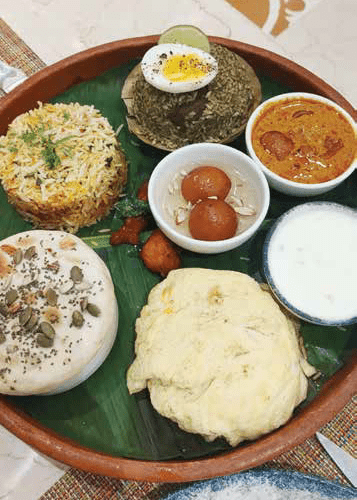
Fortune Miramar’s Biryani Festival is a fragrant journey through India’s most iconic rice dish, where every region tells its story on the plate
There are few dishes in India that evoke as much passion as the biryani. It is not merely food; it is memory, nostalgia, celebration, and comfort layered in every grain of rice. At Fortune Miramar, this affection takes center stage once again as the hotel revives its famed food festivals, this time dedicating an entire month, from September 12 to October 12, 2025; to the dish that has travelled across dynasties, borders, and kitchens, reinventing itself
with every region it touched. The festival is an ambitious tapestry of flavours, weaving together India’s diverse biryani traditions.
On one side of the menu stand the giants: Hyderabadi Biryani with its regal spice, Kolkata Mutton Biryani with its gentle fragrance of potatoes and meat, Donne Biryani with its earthy Bengaluru soul, and the elegant Awadhi Parda Biryani, baked under a flour ‘veil.’ On the other are lesser-known but equally intriguing varieties; Potlam Biryani, where rice and meat are bundled lovingly in an omelette pouch; Kozhi Biryani from Kerala, lush with coconut undertones; Gilma and Seekh Kebab Biryanis for the adventurous; Dindigul’s sharp and peppery rendition; Malabar’s Konju Biryani with its coastal prawns; and Madurai’s rustic Kari Soru Biryani.
Vegetarians too find their place in this festival of abundance, with delicate offerings like the Hyderabadi Sofiyani Biryani and even a playful Paneer Butter Masala variant that reimagines tradition with a modern wink.
For diners hesitant to commit to just one version, the Biryani Thali is a masterstroke. It allows a journey through four biryanis of one’s choice, presented with salan, raita, an appetizer, and dessert – an orchestra of accompaniments that round out the meal without overwhelming it. Choices are plentiful: salans of Mirchi, Baingan, or Pyaaz, and raitas of Boondi, Onion- Tomato, Burani, or Pineapple, each designed to cleanse and refresh the palate between the indulgent bites of spiced rice. Our table chose the Thali, eager for contrast and discovery. When it arrived, it did so with theatre: a large wooden tray carrying its quartet of biryanis, flanked by bowls of Pineapple Raita and Pyaaz Salan, and crowned with a small dish of gulab jamuns glistening in syrup.
The presentation was rustic yet elegant, a reminder that biryani is both comfort food and celebratory fare. We began with the Awadhi Parda Biryani, its flour covering gently broken to reveal layers of saffron-kissed rice and slow-cooked chicken. Each mouthful was subtle and refined, balancing sweetness, spice, and fragrance with aristocratic restraint. It was a whisper of Lucknow on the plate; measured, delicate, yet unforgettable. Next came the Potlam Biryani, perhaps the most playful of the lot. Its parcel of omelette concealed rice and chicken tinted a deep red, yet surprisingly restrained in spice. What could have been fiery turned out instead to be comforting, with each bite carrying warmth rather than heat. The omelette added texture, a silken wrapper to the hearty filling, making it as much a delight for the eyes as for the tongue. The festival would be incomplete without the Hyderabadi Biryani, and true to reputation, this was the star. The mutton, tender from hours of slow cooking, released a burst of flavour with every bite; onions caramelised into sweetness, mint and coriander weaving freshness, and the spice mix leaving a lingering warmth that invited you back for more. The rice was fragrant, long-grained, and feather-light, absorbing the essence of the meat without losing its own character. This was biryani at its most regal; bold, confident, and utterly captivating. Finally, the Donne Biryani, served in its traditional dried leaf cup, brought us back to earth. With short-grain seeraga samba rice and a green masala base, it carried a rustic charm, its flavours straightforward yet satisfying. The garnish of half a boiled egg added homely familiarity, while the leaf imparted a subtle earthiness that lingered even after the last bite. It was unpretentious, hearty, and memorable in its simplicity – a dish that wears its history proudly.
No review of this festival could end without mention of the dessert. The gulab jamuns – golden, warm, and soaked through with cardamom-scented syrup were as indulgent as they were comforting. Soft enough to collapse at the touch of a spoon, yet rich enough to linger on the palate, they were the perfect finale to an extravagant meal. So perfect, in fact, that we found ourselves asking for seconds.
Fortune Miramar’s Biryani Festival is more than a celebration of one dish; it is a celebration of India itself. Each biryani tells the story of its region – the kitchens that nurtured it, the spices that shaped it, the traditions that guarded it. To dine here is to embark on a culinary pilgrimage across the subcontinent, without ever leaving the table. For lovers of biryani, this is not just a festival; it is an invitation to taste history, culture, and passion servedone
fragrant spoonful at a time.





